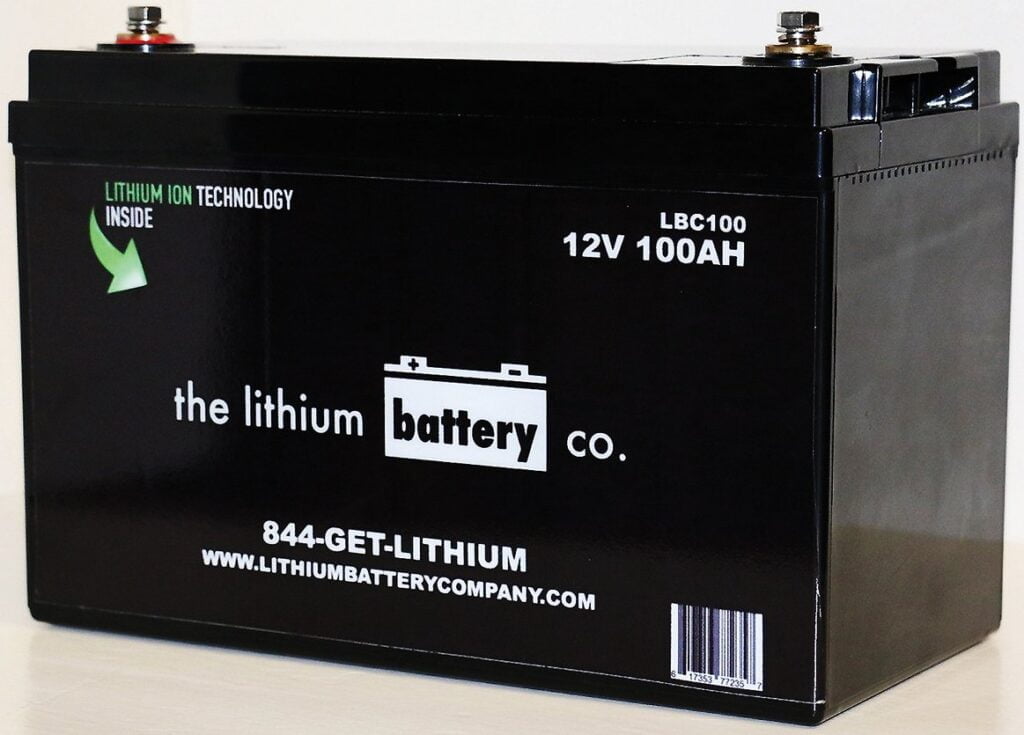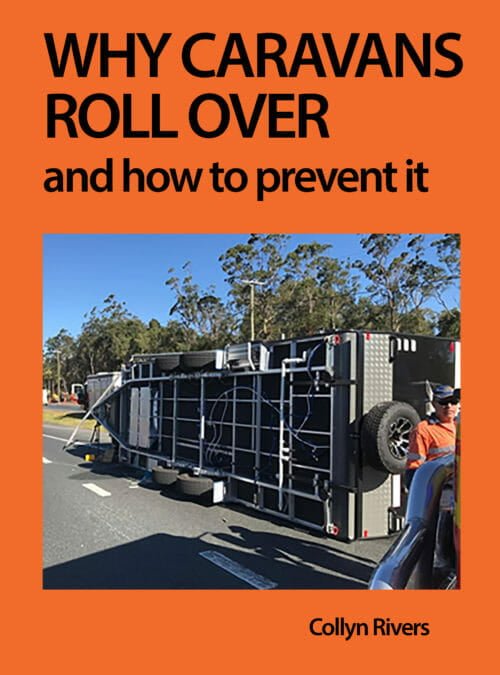Lithium-iron batteries in RVs
Lithium-iron batteries in RVs – they are safe to use. They deliver a lot of energy and pack a lot of power but need specialised knowledge to use safely and reliably. Here’s how and why for the LiFePO4 (lithium-iron) variety.

Pic: the lithium battery co.
There are two main types of rechargable lithium batteries. The so-called lithium-ion provides the most power. It is however less stable. The type generally used in RVs and home (LiFeP04) lithium-iron. The abbreviation ‘LiFePO4’ denotes their chemical make-up, i.e. it is not a trade-name. These batteries are very stable and safe to use.
Lithium-iron batteries – they are safe to use: energy and power
Energy enables work to be done. Power is a measure of the rate that energy is used. A child readily stacks 200 one kg cans (one or two at a time) on a shelf. An Olympic weight lifter heaves 200 kg that same height in a second or two. Both use the same energy but the weightlifter exerts hugely more power. Lithium-iron batteries in RVs have both energy and power.
There are good reasons to use lithium-iron batteries in RVs, but (for powering microwave ovens apart), an RV needs only minor power. Doing so is like having an Olympics weightlifter stack shelves in a supermarket. If weight is no issue, a 300 amp hour AGM battery bank is ample for RV loads and costs a fraction of lthium-iron price.
Safe to use: lighter and smaller
Lithium-iron batteries are re about one-third of the size and weight of conventional rechargeable batteries. This can of real value where space and weight are at a premium (as in most caravans). A converted coach, however, usually has space (and weight carrying ability) for a bank of far cheaper AGMs.
Chargeable very fast
Lithium-iron batteries can be charged at massively high current. One of 12 volt 100 amp-hour will readily accept a 300 amp charge. Most RV alternators supply about 70 amps so, if 50% discharged, that battery will fully charged in little over 30 minutes. Grid-voltage chargers that capacity are available – but cost over $1000.
Almost constant voltage
In RV use, lithium-iron batteries maintain a constant 13.1-13.0 volts. This only drops to 12.9 volts when they have about 20% remaining. When used like that, they are good for about 2000 such cycles. Most other batteries’ life is limited to about 500 cycles if routinely discharged below 50%.
 This graph shows the typical (per cell) voltage during discharge. That most probable for an RV is slightly above the dark blue line. That shown by the other lines are of high constant discharge and do not apply to RV use.
This graph shows the typical (per cell) voltage during discharge. That most probable for an RV is slightly above the dark blue line. That shown by the other lines are of high constant discharge and do not apply to RV use.
Such constant voltage (and in RV use) almost regardless of load, ensures that lights do not flicker when the fridge or water pump cycles on/off. Nor the fridge loses cooling, as with conventional batteries as their voltage falls.
Another lithium-iron battery plus is that energy loss whilst charging LiFePO4 is only 5% or so. That of most other types is about 20%.
Lithium-iron batteries – a truer comparison is ‘usable amp-hours’
The LiFePO4 batteries used in RVs must be compared on a ‘usable amp-hour basis. A 100 amp-hour such battery in typical RV use has much same usable capacity as a 130-150 amp hour AGM. They do, however, cost three times an AGM’s price. For RVs with limited space and weight carrying, particularly if away from grid power, such batteries are ideal.
Coach conversions and large fifth-wheelers
Where space/weight capacity is less limited a 350 amp hour or so AGM battery bank supplies ample energy and power at a third of the cost. Their life-span is shorter if routinely discharged to 50%. Increasing that bank to 450 amp hour brings it close to lithium-iron.
Lithium-iron batteries – installation and charging
This was initially a major issue. Until recent years expertise was rare. Most auto-electricians now know how it must be done. A few LiFePO4 vendors offer ‘drop-in’ direct replacements but qualify that in the small print.
Some LiFePO4 vendors claim ‘normal’ alternator charging is fine. This cannot be. There has been no such thing as a ‘normal’ alternator since 2000. Then, alternator outputs began to vary: from 12.7 volts to +14.7 volts. Many had voltage varying with load and/or temperature. Some now vary from +15 volts to 12.3 volts. Or, at times, even fall to zero volts.
To cope with such varying voltage, many major alternator chargers makers have units specifically for LiFePO4. Or include a LiFePO4 option. Such chargers include under/over voltage protection and cell balancing. Some also accept solar input.
Lithium-iron batteries – pricing
This is still an issue. It is readily possible to assess AGM and lead-acid battery capacity. It relates to lead content. A typical 12 volt 100 amp-hour AGM battery will weight about 33 kg).
Unlike lead acid and AGM batteries, there are fewer lithium-iron battery makers. Many are the same product sold under various brand names, and labelled accordingly. These are often sold via several supply chains: each adds a profit margin. As a result, (apart from the labelling) othewise totally identical products may vary in price. This issue is lessening as competition increases. It still cannot be assumed, however, that higher price equals higher quality.
Installing lithium-iron batteries in RVs – they are safe to use
The subject matter of article on Lithium-iron batteries in RVs – they are safe to use, is too complex to fully explain in article form. It is, however, totally covered in our associated books Caravan & Motorhome Electrics, and Solar That Really Works! Both are now in a choice of digital and print versions.
Note: Until recently, many makers of lithium-iron batteries originally referred to them as ‘lithium-ion’. Some still do.


 This graph shows the typical (per cell) voltage during discharge. That most probable for an RV is slightly above the dark blue line. That shown by the other lines are of high constant discharge and do not apply to RV use.
This graph shows the typical (per cell) voltage during discharge. That most probable for an RV is slightly above the dark blue line. That shown by the other lines are of high constant discharge and do not apply to RV use.


